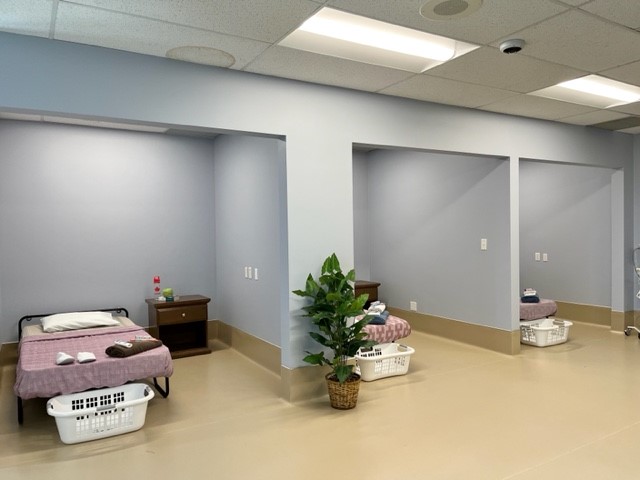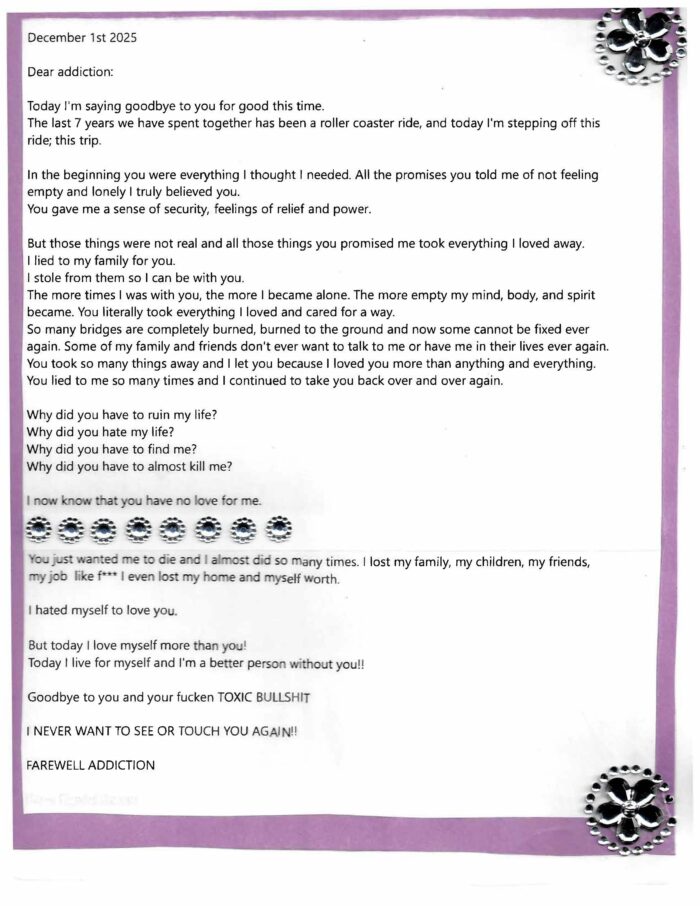We offer a pathway to recovery.
No fees. No judgement.
The toxic drug crisis continues to deeply affect Calgarians who face addiction and mental health issues. Despite a strong desire to recover, many individuals navigate complex paths to withdrawal management and recovery programs. This can be the difference between a turning point and a missed opportunity.
Our Recovery-Oriented System of Care program is for anyone who is ready to take the first steps in treating their addiction. Free of charge and free of judgement.
Our Programs
Our Recovery-Oriented System of Care programs consist of two separate programs, operating in the same space, within a secure floor of the Calgary Drop-In Centre’s main building in East Village.
Program Description:
We provide a safe space to withdraw from alcohol, drugs, or other substances in a medically supported environment, using an abstinence-based approach. Typical length of stay is 5-10 days. The multidisciplinary team works with clients to refer to housing supports, treatment centres, or other recovery-oriented services as part of discharge planning.
Services:
Access to addictions counseling
24/7 staff support
Medically supported withdrawal management guided by a physician and nursing team
Ongoing withdrawal management assessments
Assistance with daily medications
Opioid Replacement Therapy
In-house group sessions such as Sharing Circles, 12-step group sessions, SMART Recovery group sessions, health education and promotion, wellness activities, and more
Program Details:
We provide a safe space for people to work towards treatment, recovery and housing goals. This program aims to support clients in preparing for their upcoming treatment or housing intake date and offers support such as discharge planning, goal setting, addiction counselling, group facilitation, and referrals to community resources.
Length of stay is up to 3 months depending on progress with recovery goals, health status and wait time for treatment, recovery, and other housing services. The multidisciplinary team will work with clients to refer them to housing supports, treatment centres, or other recovery-oriented services as part of discharge planning. Clients are expected to actively participate in their own discharge planning and in programming.
Services:
- 24/7 staff support
- Addictions counselling
- Individual and group peer-based supports
- Recovery care planning, goal setting and discharge planning
- Diversion and housing support
- Life skills groups
- Wellness activities
- Health education and promotion
- In-house group sessions such as Sharing Circles, 12-step group sessions, SMART Recovery group sessions, health education and promotion, wellness activities, and more
- Efforts will be made to offer cultural and religious support to meet unique client needs
Eligibility Requirements:
Eligible clients must have completed a detox stay prior to program intake. Additionally, eligible clients will be on at least two treatment program waitlists OR have an upcoming confirmed treatment date.
Program Amenities
Our recovery-oriented programs are located in a private and secure floor within the Calgary Drop-In Centre’s main building in East Villlage. Those attending our recovery-oriented programs will have access to:
- Complimentary meals and snacks
- Laundry facilities
- Basic toiletries and clothing (if needed)
- Help with reconnecting with family, friends, culture, and community
- Private, on-site, outdoor smoking area
- Access to in-house volunteer hairdresser and weekly yoga classes
- Group activities
- Guests may keep their personal devices, and everyone has access to shared computers

Our Team

Recovery Care Support Staff

Peer Support Staff

Addictions Counsellors

Physicians

Nurses

Social Workers
If you are inquiring for yourself, you do not require a referral form. If you prefer, you can also call us at 403-699-8236 to discuss your options.
If you are a service provider inquiring on behalf of someone else, please download the form below and upload it to your submission.
Frequently Asked Questions
Our Recovery-Oriented System of Care (ROSC) programs consist of two separate programs, operating in the same space, within a secure area of the Calgary Drop-In Centre’s main building at 1 Dermot Baldwin Way SE.
There are different requirements for each of our two programs.
Withdrawal Management is a co-ed program for individuals of all genders, 18+, and both housed and unhoused individuals are welcome. We currently have 15 beds available as part of this inpatient detox unit. Individuals must be in a state of active substance use for a bed in the Withdrawal Management program. If they have not used substances in the past 72 hours, they do not qualify for a bed.
The second phase of our ROSC program is Recovery Transition. We currently have 20 beds available. This is an inpatient, abstinence-based, pre-treatment program that is open to all genders, aged 18+, and both housed and unhoused individuals are welcome. However, eligible clients will have completed a detox stay, either in our Withdrawal Management program, or another external facility. Door-to-door transportation must be provided from the sending facility.
To qualify for our Recovery Transition program, individuals must have been medically cleared for discharge from a detox facility and be on a waitlist for a treatment facility. More specifically, we ask that individuals have a confirmed intake date at a treatment facility or be on a minimum of two waitlists. The program is not intended for individuals that do not have recovery-oriented goals.
Yes, our general space is wheelchair accessible, but the smoke deck dedicated to this program is not. We make every attempt to support all clients of our programs. However, we ask that individuals be able to maintain their own activities of daily living. This means being able to transfer from their wheelchair to bed, shower, etc. Though we make every attempt to provide an accessible experience for everyone, we cannot guarantee bottom-bunk availability.
The length of stay is dependent on the individual’s substance use history and their condition while detoxing. Most people are in the Withdrawal Management program between 5 and 7 days, and clients of our Recovery Transition program can stay for up to three months.
The program supports individuals with all substance use disorders, although we are unable to accept individuals with process disorders such as gambling addiction.
The Withdrawal Management program provides 24/7 Licensed Practical Nurses, access to a physician 7 days a week (although remote visits might be required on weekends and holidays), as well as a dedicated Registered Social Worker during the week and voluntarily access to Addictions Counselor a few evenings a week.
The Recovery Transition program is not a medically supported program. Instead, we offer access to Peer Support Workers, Recovery Care Workers, a Registered Social Worker, and Addictions Counsellor. We also provide both internal and external group therapy programming, recreation activities, and access to recovery community events. Individuals in this program will access medical assistance in the community, as needed.
Individuals in the Withdrawal Management program are not permitted to have day passes or leave the treatment area during their admission. There are no exceptions granted. If an individual chooses to leave, they will be discharged from the program and a restriction of services from the program will be in place for a minimum of three days, depending on the scenario.
Individuals in the Recovery Transition program may qualify for day passes, outside of the mandatory programming schedule, although they may not qualify for a day pass until they have been admitted to the program for up to 24 hours, depending on circumstances. We also plan a variety of group activities and outings when available.
Anyone interested in our Withdrawal Management program can contact us using the contact form on this webpage or by calling us at 403-699-8236. Alternatively, folks can come to the Calgary Drop-In Centre’s main lobby at the time of triage assessment, which is 7 am, 7 days/week, although entry is not guaranteed.
In order to gain access to the lobby, individuals will be asked to create a profile and receive a “New Guest Orientation” to the Emergency Shelter, which is required of all new guests of the DI. This orientation includes an introduction to all services offered at the DI (not just our ROSC programs), as well as recording of personal information (name, date of birth, etc.) and a Consent to Services. This process can take up to 30 minutes.
If someone has never stayed at the DI before, we recommend that they come at least 30 minutes before triage assessments begin, around 6:30 am, so that they complete all requirements in time.
Admission is based on bed availability and severity of withdrawal symptoms/likelihood for withdrawal complications; NOT first come, first served. Individuals must be in a state of active substance use for a bed in the detox program. If they have not used substances in the past 72 hours, they do not qualify for a bed.
Please download our Referral Form and fill it out to the best of your ability. Once complete, you can use the contact form on this webpage to make your referral. Please be sure to attach your referral form to your message or fax to 403-538-6591. We will contact you with the next steps. Submitting a referral does not guarantee a bed in our program.








